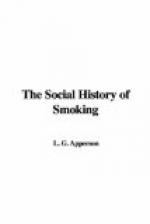It is significant that the writer of a life of Philips, which was prefixed to an edition of his poems which was published in 1762, after mentioning that smoking was common at Oxford in the days of Aldrich, says apologetically, “It is no wonder therefore that he [Philips] fell in with the general taste ... he has descended to sing its praises in more than one place.” By 1762, as we shall see, smoking was quite unfashionable, and consequently it was necessary to explain how it was that a poet could “descend” so low as to sing the praises of tobacco.
Other well-known men of the late seventeenth century were “tobacconists” in the old sense of the word. Sir Isaac Newton is said to have smoked immoderately; and a familiar anecdote represents him as using for the purposes of a tobacco-stopper, in a fit of absent-mindedness, the little finger of a lady sitting beside him, whom he admired, but the truth of this legend is open to doubt. Thomas Hobbes, who lived to be ninety (1588-1679), was accustomed to dine at 11 o’clock, after which he smoked a pipe and then lay down and took a nap of about half an hour. No doubt he would have attributed the length of his days to the regularity of his habits. Izaak Walton, who also lived to be ninety, as the lover of the placid and contemplative life deserved to do, loved his pipe, though he seldom mentions smoking in the “Compleat Angler.” Sir Samuel Garth, poet and physician, once known to fame as the author of “The Dispensary,” was another pipe-lover, as is shown by his verses quoted at the head of this chapter. Dudley, the fourth Lord North, began to smoke in 1657, and, says Dr. Jessopp, “the habit grew upon him, the frequent entries for pipes and tobacco showing that he became more and more addicted to this indulgence. Probably it afforded him some solace in the dreadful malady from which he suffered so long.”
Even the staid Quakers smoked. George Fox’s position in regard to tobacco was curious. He did not smoke himself; but on one occasion he was offered a pipe by a jesting youth who thought thereby to shock so saintly a person. Fox says in his “Journal,” “I lookt upon him to bee a forwarde bolde lad: and tobacco I did not take: butt ... I saw hee had a flashy empty notion of religion: soe I took his pipe and putt it to my mouth and gave it to him again to stoppe him lest his rude tongue should say I had not unity with ye creation.” The incident is curious, but testifies to Fox’s tolerance and breadth of outlook.
Many of his followers smoked, sometimes apparently to such an extent as to cause scandal among their brethren. The following is an entry in the minutes of the Friends’ Monthly Meeting at Hardshaw, Lancashire: “14th of 4th mo. 1691. It being considered that the too frequent use of smoking Tobacco is inconsistent with friends holy profession, it is desired that such as have occasion to make use thereof take it privately, neither too publicly in their own houses, nor by the highways, streets, or




